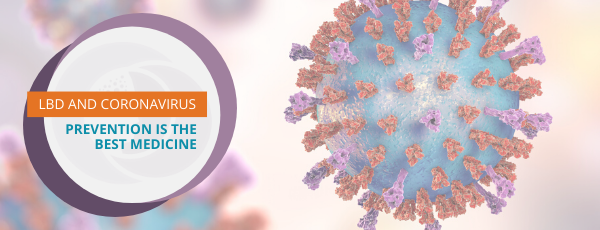
With all of the news about the coronavirus and the condition “COVID-19,” here are some things that LBD families should keep in mind in the coming weeks and months.
- This is a rapidly evolving situation; visit the U.S. Centers for Disease Control (CDC) website for the most up-to-date information.
- Older adults and those with serious, chronic health conditions are at increased risk for getting very sick from this illness. Some people with LBD fall into both categories, so it is especially important to reduce the risk of exposure for some people with LBD. For more information, visit the CDC website for information for people who are at higher risk.
- According to the CDC, the best way to prevent illness is to avoid being exposed to this virus. Here are steps you can take to protect yourself:
- Clean your hands often: Wash your hands often with soap and water for at least 20 seconds especially after you have been in a public place, or after blowing your nose, coughing, or sneezing. If soap and water are not readily available, use a hand sanitizer that contains at least 60% alcohol. Cover all surfaces of your hands and rub them together until they feel dry.
- Avoid close contact: Avoid close contact with people who are sick. Put distance between yourself and other people if COVID-19 is spreading in your community
- In consultation with several LBD experts, here are some additional things LBD families should consider to reduce possible exposure:
- People with Lewy body dementia may have a harder time understanding public health messages about coronavirus. Instructions to reduce risks, such as self-isolation or handwashing, may be more difficult for them to follow. Care partners can help by staying calm, providing reassurance, and providing help to reduce exposure risks.
- Be understanding of any limitations placed on visits to long term care facilities. Limits may be put in place to minimize the risk to all residents who are at a heightened risk from the virus.
- Minimize in-person attendance for medical appointments. Contact your physician’s office to see if the appointment can be done by phone or video. If you have questions whether or not to come in for an appointment, contact your doctor’s office.
- If you are in a research study, schedules for study visits may be disrupted; study coordinators may contact participants regarding upcoming visits. If you have concerns or questions about attending an upcoming appointment, contact the study coordinator.
For our Support Services Volunteers/Support Group Facilitators: Many of you meet in senior facilities/healthcare locations and have already had your meetings cancelled. We are recommending cancelling your in-person meetings and consider meeting via phone/video conferencing if possible. There are a few free options for you to use such as freeconferencecall.com. Contact LBDA’s Support Services if you have any questions/concerns about providing support to your members during this time.